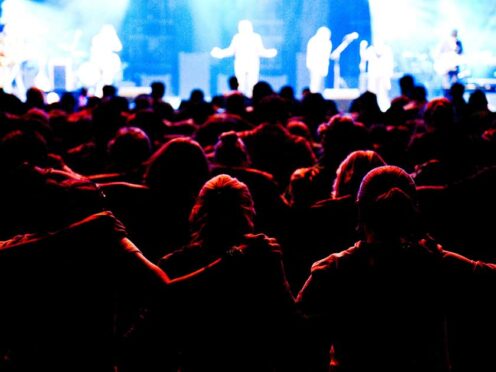The Chancellor has been urged to provide help to music venues ahead of next week’s Budget.
UK Music has called on Jeremy Hunt to use his Budget on March 6 to cut the current 20% VAT rate on ticket prices to 10%, which the body claimed would support venues, musicians and consumers.
It also wants the end of secondary ticketing practices, where tickets for concerts are re-sold at higher prices.
This comes as research shows more than 100 venues closed or stopped hosting live music in 2023.

The high-profile closures include Bath venue Moles, which Ed Sheeran, Oasis and Radiohead played at early in their careers.
UK Music interim chief executive Tom Kiehl said: “We urgently need to see some action from the Chancellor in the Budget to support the UK music industry at what is an immensely tough time for many venues and for those working in our sector.”
He added that changes to VAT “would be a vital lifeline and could mean the difference between saving and losing some of our most loved music venues, which are key parts of many local economies and communities”.
“Reducing the tax burden will help boost investment at grassroots level and give local venues and economies across the UK a much-needed shot in the arm,” he said.
“Venues are part of a wide music ecosystem, which needs support in a number of important areas to help the sector grow and thrive.”
Mr Kiehl also said UK Music, which represents artists and record labels among others, has “serious concerns” about artificial intelligence (AI) and the “threat it poses to their income and copyright”.
As part of our work, UK Music makes regular submissions to the Government on issues that matter to the music industry.
You can read more about those submissions here: https://t.co/3Ffu9OFSYG pic.twitter.com/BCht1h6NTl
— UK Music (@UK_Music) February 24, 2024
He also raised issues including the number of music teachers, whether the Orchestra Tax Relief would be extended and claims of barriers faced by musicians touring in the EU.
Mr Kiehl added: “The UK has a world-leading music sector. However, it needs action from the Government to ensure it can continue to grow for decades to come.”
The body also wants millions invested in music education and the recruitment of teachers, strong copyright standards, clear labelling and record-keeping requirements amid AI use, an agreement with the EU for touring acts and a tax credit introduced for new UK music production.
The Music Venue Trust (MVT), which represents hundreds of the UK’s local music venues, said grassroots venues experienced their “worst year” for closures in a decade last year when 125 spaces stopped staging live performances.
The charity has also estimated every £10 spent on a live music ticket is worth £17 to the local economy.
During the last year, orchestras have faced several difficult periods.
The English National Opera’s musicians have been dealing with management plans to cut jobs.
Amid financial strain at the BBC, the corporation has also applied for orchestral tax relief application for its groups, which include the symphony, concert and philharmonic orchestras.
